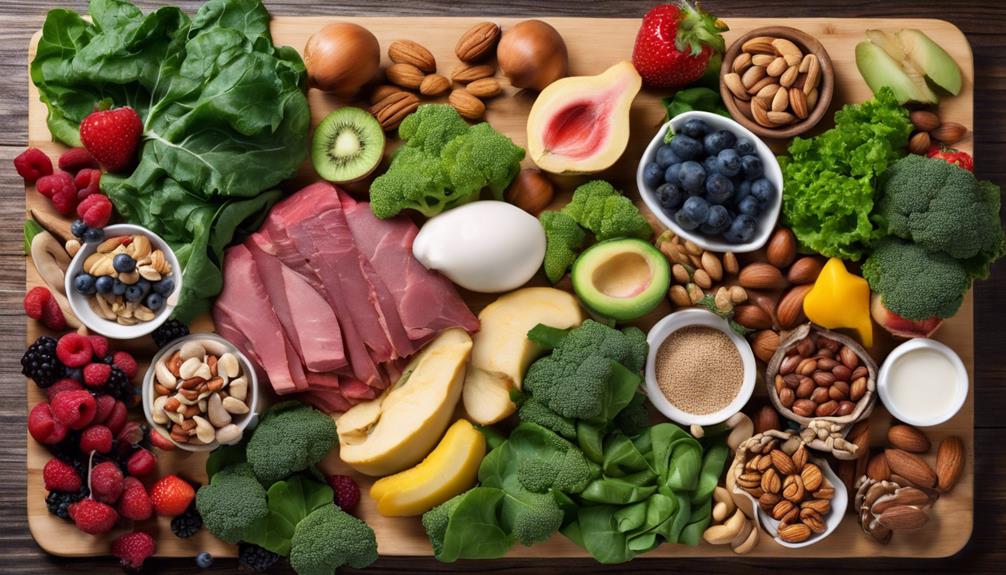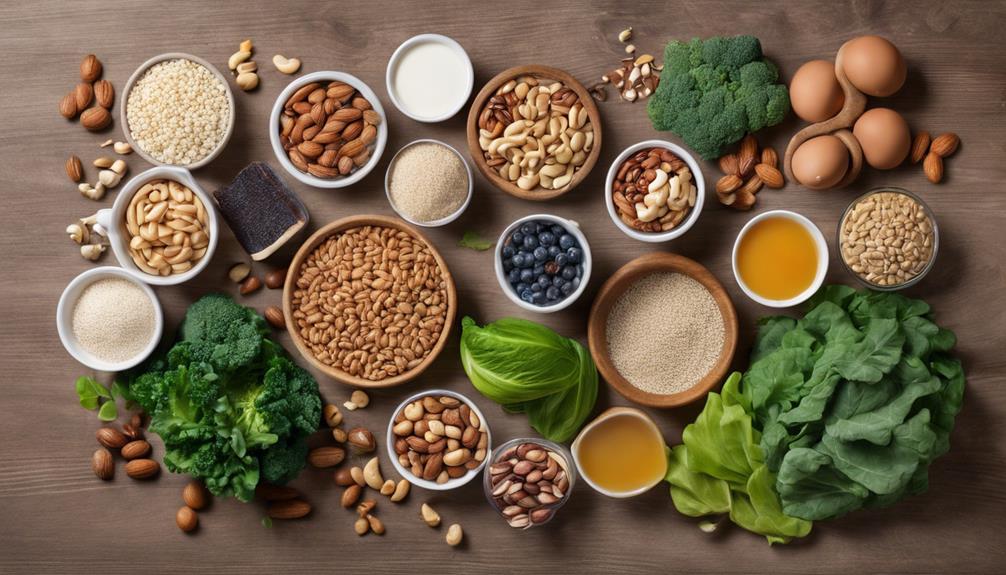When it comes to postpartum breastfeeding diet tips, striking the right balance between nourishment and enjoyment can be a delicate task.
As new moms navigate this important period, understanding the nuances of what they consume is key to supporting both their own well-being and that of their newborn.
From the significance of hydration to the specific nutrients necessary for best milk production, there are essential guidelines tailored to this unique phase that can pave the way for a successful breastfeeding journey.
Key Takeaways
- Stay well-hydrated for milk production and recovery.
- Include nutrient-rich foods for optimal health.
- Limit caffeine and alcohol intake for baby's well-being.
- Consult healthcare providers for essential supplements.

Frida Mom Upside Down Peri Bottle for Postpartum Care, Portable Bidet Perineal Cleansing and Recovery for New Mom, The Original Fridababy MomWasher
POSTPARTUM PERINEAL CLEANSING BOTTLE: Revolutionary upside-down design with precision-angled neck directs gentle water stream exactly where needed for…
As an affiliate, we earn on qualifying purchases.
As an affiliate, we earn on qualifying purchases.
Importance of Hydration
Staying well-hydrated is essential for breastfeeding mothers as it directly impacts milk production and overall postpartum recovery. Adequate fluid intake is important because breast milk is mostly water. Dehydration can hinder milk production and quality, underscoring the significance of regular water consumption.
To guarantee ideal hydration levels, breastfeeding mothers should drink water whenever they feel thirsty and monitor their urine color and smell. By maintaining proper hydration, mothers support a healthy milk supply and aid in their postpartum recovery and well-being. Hydration also plays an important role in preventing common issues like constipation and fatigue that can arise during breastfeeding.

Baby Blues Apple Cider Vinegar Postpartum Gummies with B6 and B12, Vegan, Non-GMO, Postpartum Vitamins Breastfeeding, Postnatal Vitamins for Women, Post partum Dietary Supplements for Mom, 60pcs
Postpartum Energy Support – Stay energized with postpartum gummies combining apple cider vinegar, B6, and B12. A tasty…
As an affiliate, we earn on qualifying purchases.
As an affiliate, we earn on qualifying purchases.
Nutrient-Rich Foods to Include

As we focus on nourishing our bodies during the postpartum period, incorporating nutrient-rich foods into our diet becomes paramount for supporting both our own well-being and the quality of breast milk for our little ones.
Including protein-rich foods like lean meat, poultry, fish, eggs, dairy, beans, nuts, and seeds is essential for top-notch nutrition during breastfeeding.
Aim for at least three servings of vegetables daily, with a focus on dark green and yellow varieties to meet your vitamin and mineral needs.
Don't forget to add two servings of fruit each day to boost your intake of vitamin C, fiber, and antioxidants, all crucial for your postpartum diet.
Opt for whole grains such as whole wheat bread, pasta, cereal, and oatmeal to provide sustained energy and essential nutrients.
Remember to stay hydrated with water to support milk production and maintain overall hydration levels while breastfeeding.

My Brest Friend Nursing Pillow – Deluxe – Enhanced Comfort w/ Slipcover – Ergonomic Breastfeeding Pillow For Ultimate Support For Mom & Baby – Adjustable Pillow W/ Handy Side Pocket, Soft Rose
ERGONOMIC DESIGN: Elevate your nursing journey with our unique nursing pillow. The wrap-around feature ensures ideal positioning &…
As an affiliate, we earn on qualifying purchases.
As an affiliate, we earn on qualifying purchases.
Managing Caffeine and Alcohol Intake
Limiting caffeine and alcohol intake is essential for breastfeeding mothers to guarantee the well-being of their baby and minimize any potential negative effects on milk quality.
When it comes to managing caffeine and alcohol intake while breastfeeding, here are some important tips to keep in mind:
- Caffeine Awareness: It's advised to limit caffeine intake to 300 milligrams per day. Caffeine can transfer to breast milk, reaching peak levels within 1-2 hours after consumption, potentially affecting the baby's sleep patterns.
- Alcohol Moderation: Alcohol consumption can impact breast milk for up to 2-3 hours after intake. To minimize exposure to the baby, wait 2-3 hours after consuming alcohol before breastfeeding or pumping. Remember, moderation is key, with one standard drink considered safe per day.
- Timing Is Everything: Understanding the timing of when caffeine and alcohol affect breast milk can help you make informed choices for both yourself and your baby. Being mindful of these guidelines can contribute to a positive breastfeeding experience for you and your little one.

Traditional Medicinals Organic Mother's Milk Women's Tea 32 Count (Pack of 1)
Herbal Power: Promotes breast milk production for nursing mothers
As an affiliate, we earn on qualifying purchases.
As an affiliate, we earn on qualifying purchases.
Supplements for Breastfeeding Moms

To support peak health during breastfeeding, incorporating essential supplements into your diet can be beneficial for both you and your baby. While continuing prenatal vitamins postpartum can provide excess iron and folic acid, some breastfeeding mothers, especially vegetarians, may benefit from multivitamin supplementation to meet the increased Recommended Dietary Allowances (RDAs) for essential nutrients during lactation.
Consulting healthcare providers for guidance on appropriate dietary supplements is important to make sure you receive adequate nutrition while breastfeeding. Specific supplements like vitamin B12 and omega-3 DHA play an important role in maintaining peak health during this period. Vitamin B12 is important for energy production and the nervous system, while omega-3 DHA supports your baby's brain and eye development.
Foods to Limit or Avoid
Considering the impact of dietary choices on both you and your baby's well-being, it's important to be mindful of certain foods to limit or avoid while breastfeeding.
- Avoid Alcohol: It's important to steer clear of alcohol entirely while breastfeeding as it can pass through breast milk and negatively impact your baby's development.
- Limit Caffeine: Keep your caffeine intake in check, aiming for no more than 2-3 cups a day to prevent overstimulation in your little one.
- Watch Seafood High in Mercury: Be cautious of seafood varieties high in mercury such as shark, swordfish, king mackerel, and tilefish, as they can harm your baby's developing nervous system.
Frequently Asked Questions
What Should I Eat Postpartum for Lactation?
We should focus on eating protein-rich foods like lean meat, poultry, fish, eggs, dairy, beans, nuts, and seeds to support milk production postpartum. It's vital to stay hydrated, consume whole grains, and plenty of fruits and vegetables for overall wellness.
What Is the Best Diet for Breastfeeding Mothers?
We prioritize nutrient-rich foods, hydration, and avoiding alcohol/limiting caffeine while breastfeeding. Our bodies need extra calories, around 330-400 more daily, to support milk production. It's crucial to care for ourselves to nourish our little ones.
What Should a Postpartum Mother Eat?
We should focus on nutrient-rich foods like lean proteins, whole grains, fruits, and veggies to support breastfeeding. It's essential to include vitamins and minerals for recovery and milk production. Hydration is key, so drink water and avoid sugary drinks.
What Is the Most Important Food While Breastfeeding?
The most important food while breastfeeding is a balanced diet rich in protein for tissue repair, omega-3 fatty acids for brain development, iron for energy, calcium for bone health, and hydration for milk production.
Conclusion
As we navigate the journey of postpartum breastfeeding, let's remember that our bodies are like gardens in need of tender care and nourishment.
Just as a garden flourishes with the right balance of sunlight, water, and nutrients, so too do our bodies thrive when we prioritize hydration, nutrient-rich foods, and self-care.
Let's continue to nurture ourselves with love and intention, knowing that our well-being is essential for the growth and nourishment of our little ones.









